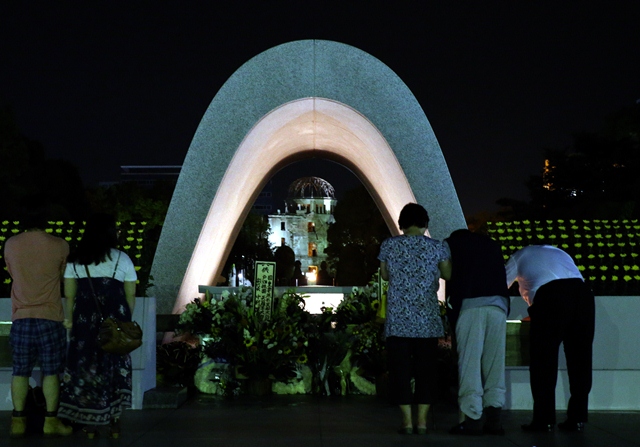Hiroshima observes 68th anniversary of A-bombing
Aug. 6, 2013
Participants vow to advance nuclear-free world
On the morning of August 6, sixty-eight years since the atomic bombing of Hiroshima, the city held a solemn Peace Memorial Ceremony in Hiroshima Peace Memorial Park. Tens of thousands attended the ceremony, including hibakusha (A-bomb survivors), family members of the victims, Prime Minister Shinzo Abe and other government officials, and city residents. Thousands of non-Japanese were also present, including the ambassadors of many nations and the participants of the major conferences being held by Mayors for Peace and the World Conference against Atomic and Hydrogen Bombs. All mourned the victims of the bombing and pledged to promote the elimination of nuclear weapons from the earth.
The ceremony began at 8:00 a.m. Hiroshima Mayor Kazumi Matsui and two representatives of the bereaved families placed the Register of Atomic Bomb Victims, with the names of 5,859 survivors whose deaths were confirmed this year, into the stone coffin beneath the Cenotaph for the Atomic Bomb Victims. The register now comprises 104 volumes and holds the names of 286,818 victims.
At 8:15 a.m., the time the atomic bomb exploded, the Peace Bell was rung by a representative of the bereaved families and a representative of Hiroshima’s children as the participants observed a moment of silence. Mr. Matsui then read aloud the Peace Declaration, saying, “The city of Hiroshima and the more than 5,700 cities that comprise Mayors for Peace, in collaboration with the UN and like-minded NGOs, seek to abolish nuclear weapons by 2020 and throw our full weight behind the early achievement of a nuclear weapons convention.”
After the declaration, Shunji Takeuchi and Yuzu Nakamori, both 11 and in sixth grade at Hiroshima elementary schools, read out the Commitment to Peace with conviction on behalf of the city’s children. “Peace is something we ourselves create. For this reason, we convey our gratitude to the people close to us, our friends and family. Through dialogues with many people, we learn that there are many different ways of thinking. Through sports, music, and the things we are good at, we interact with the people of the world.”
Finally, all joined together in singing the Hiroshima Peace Song, and the ceremony ended at 8:55 a.m.
August 6 in the A-bombed city brought a blend of remembrance of the past and resolve for peace and nuclear abolition. After the ceremony, a seemingly endless line of mourners placed flowers and offered incense sticks at the Cenotaph, followed by a wide range of meetings and concerts, all calling for a world without war and nuclear weapons. This evening, lanterns will be floated in the Motoyasu River near the A-bomb Dome, as in years past.
On the morning of August 6, sixty-eight years since the atomic bombing of Hiroshima, the city held a solemn Peace Memorial Ceremony in Hiroshima Peace Memorial Park. Tens of thousands attended the ceremony, including hibakusha (A-bomb survivors), family members of the victims, Prime Minister Shinzo Abe and other government officials, and city residents. Thousands of non-Japanese were also present, including the ambassadors of many nations and the participants of the major conferences being held by Mayors for Peace and the World Conference against Atomic and Hydrogen Bombs. All mourned the victims of the bombing and pledged to promote the elimination of nuclear weapons from the earth.
The ceremony began at 8:00 a.m. Hiroshima Mayor Kazumi Matsui and two representatives of the bereaved families placed the Register of Atomic Bomb Victims, with the names of 5,859 survivors whose deaths were confirmed this year, into the stone coffin beneath the Cenotaph for the Atomic Bomb Victims. The register now comprises 104 volumes and holds the names of 286,818 victims.
At 8:15 a.m., the time the atomic bomb exploded, the Peace Bell was rung by a representative of the bereaved families and a representative of Hiroshima’s children as the participants observed a moment of silence. Mr. Matsui then read aloud the Peace Declaration, saying, “The city of Hiroshima and the more than 5,700 cities that comprise Mayors for Peace, in collaboration with the UN and like-minded NGOs, seek to abolish nuclear weapons by 2020 and throw our full weight behind the early achievement of a nuclear weapons convention.”
After the declaration, Shunji Takeuchi and Yuzu Nakamori, both 11 and in sixth grade at Hiroshima elementary schools, read out the Commitment to Peace with conviction on behalf of the city’s children. “Peace is something we ourselves create. For this reason, we convey our gratitude to the people close to us, our friends and family. Through dialogues with many people, we learn that there are many different ways of thinking. Through sports, music, and the things we are good at, we interact with the people of the world.”
Finally, all joined together in singing the Hiroshima Peace Song, and the ceremony ended at 8:55 a.m.
August 6 in the A-bombed city brought a blend of remembrance of the past and resolve for peace and nuclear abolition. After the ceremony, a seemingly endless line of mourners placed flowers and offered incense sticks at the Cenotaph, followed by a wide range of meetings and concerts, all calling for a world without war and nuclear weapons. This evening, lanterns will be floated in the Motoyasu River near the A-bomb Dome, as in years past.








